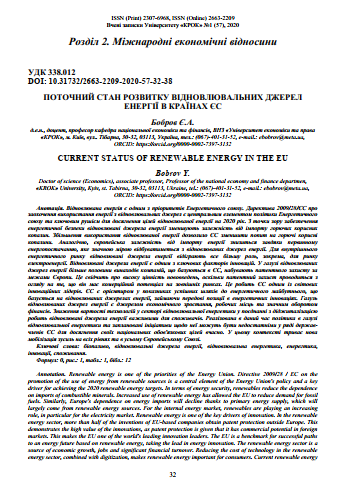CURRENT STATUS OF RENEWABLE ENERGY IN THE EU
DOI:
https://doi.org/10.31732/2663-2209-2020-57-32-38Keywords:
biofuels, renewable energy sources, renewable energy, energy, innovation, consumptionAbstract
Renewable energy is one of the priorities of the Energy Union. Directive 2009/28 / EC on the promotion of the use of energy from renewable sources is a central element of the Energy Union's policy and a key driver for achieving the 2020 renewable energy targets. In terms of energy security, renewables reduce the dependence on imports of combustible minerals. Increased use of renewable energy has allowed the EU to reduce demand for fossil fuels. Similarly, Europe's dependence on energy imports will decline thanks to primary energy supply, which will largely come from renewable energy sources. For the internal energy market, renewables are playing an increasing role, in particular for the electricity market. Renewable energy is one of the key drivers of innovation. In the renewable energy sector, more than half of the inventions of EU-based companies obtain patent protection outside Europe. This demonstrates the high value of the innovations, as patent protection is given that it has commercial potential in foreign markets. This makes the EU one of the world's leading innovation leaders. The EU is a benchmark for successful paths to an energy future based on renewable energy, taking the lead in energy innovation. The renewable energy sector is a source of economic growth, jobs and significant financial turnover. Reducing the cost of technology in the renewable energy sector, combined with digitization, makes renewable energy important for consumers. Current renewable energy policies and planned initiatives may not be sufficient in a number of EU Member States to achieve their national binding targets on time. In this context, there is a continuing mobilization effort at all levels and throughout the European Union.
Downloads
References
Directive (EU) 2018/2001 of the European Parliament and of the Council of 11 December 2018 on the promotion of the use of energy from renewable sources.
Directive 2009/28/EC of the European Parliament and of the Council of 23 April 2009 on the promotion of the use of energy from renewable sources.
Renewable energy in Europe — 2018. Recent growth and knock-on effects. European Environment Agency Report № 20/2018. URL : https://www.eea.europa.eu/publications/renewable-energy-in-europe-2018.
COM(2018) 773: A Clean Planet for all. A European strategic long-term vision for a prosperous, modern, competitive and climate neutral economy.
Renewable energy in Europe — 2018. Recent growth and knock-on effects. European Environment Agency Report № 20/2018. URL : https://www.eea.europa.eu/publications/renewable-energy-in-europe-2018.
Monitoring R&I in Low-Carbon Energy Technologies, Joint Research Centre, 2017. URL : http://publications.jrc.ec.europa.eu/repository/handle/JRC105642.
Report on Innovation landscape for a renewable-powered future: Solutions to integrate variable renewables, IRENA.
The state of renewable energies in Europe (2018). EurObserv’ER,18th annual overview barometer. URL : https://www.eurobserv-er.org/18th-annual-overview-barometer.
Report on energy prices and costs in Europe. URL : https://ec.europa.eu/energy/en/data-analysis/energy-prices-and-costs.
Off-grid Renewable Energy Solutions: Global and Regional Status and Trends, IRENA. URL : https://www.irena.org/-/media/Files/IRENA/Agency/Publication/2018/Jul/IRENA_Off-grid_RE_Solutions_2018.pdf.
Eurostat. The use of renewable energy sources. URL : https://ec.europa.eu/eurostat/web/energy/data/shares.
Navigant 2019: Technical assistance in realisation of the 4th report on progress of renewable energy in the EU, final report.


